- Home
- James Axler
Playfair's Axiom Page 25
Playfair's Axiom Read online
Page 25
“That was, of course,” Brother Joseph continued, “before I discovered it was even easier, and far more gratifying, to tinker with the minds and hearts of men. And then a decade or so ago a chance discovery in simple frequency modulation put the perfect tool for social engineering into my hands.”
“Your subsonic-supersonic screamwing control mechanism,” Mildred said. She was climbing right behind the fallen spiritual leader. Since she seemed to have the most active dislike of the man, she seemed a good candidate to keep his sandaled feet to the straight and narrow, as it were. As if he had much opportunity to stray in here.
They came to a landing. It was marked 20.
“A trifling twenty-two floors left to go,” Doc said.
“One more,” Ryan said, making himself pick up one foot and put it in front of another. Slick cloying sweat encased him inside his clothes.
They hadn’t had the kind of day that really prepared them triple-well for climbing as near as maybe to six hundred feet inside an airless, brutally hot stairway. He couldn’t readily imagine what sort of day that would have been, actually. But he was sure it was about the opposite of this one.
While J.B. covered with his scattergun and Doc stood by with his lantern, Krysty pushed open the door to the twentieth floor. Ryan made himself continue as she vanished from sight to the other side. After an interval she reappeared.
“Got it propped,” she called.
“Okay,” Ryan called.
He reached the next landing and stopped. He continued to walk in place for a spell to keep his legs from knotting up. The others did likewise as they arrived.
He set down the lantern so its light played on the door. “Somebody cover me,” he said. “I got this one.”
His P-226 in hand, he stepped through. As always, the door led onto a little service area. Beyond it, he knew, waited the metal doors of the elevator bank. Beyond that the shells of whatever businesses had occupied this floor of the great tower.
A breath of breeze blew past him from the outside. From exploring several of the lower floors, they knew that while the monster skyscraper seemed to have survived the thermonuclear airburst with structural integrity mostly intact, all the windows were gone on all four sides. Meaning quakes had probably settled for those left behind by the blast wave.
By the yellow lantern glow Ryan saw a mop in a rolling wringer bucket standing out in the open. He pulled over the bucket and used it to wedge the door to the stairs open. Then with a metal-on-metal clangor he pulled out the mop. Its head had fossilized into a weird squashed wavy pattern.
It would save them time they could ill afford, and possibly risk, next time they had trouble finding something to hold open the door.
Doc was squatting just outside the door fanning himself with his hand when Ryan returned to the landing. He had set his lantern down beside him.
“It seems almost as if I can feel a breath of air stirring,” he said.
“Object of the exercise, Doc.”
He reached for his lantern. Krysty’s white hand closed over the handle first. “No. Mildred and I’ll carry the lights for a while. Won’t do us any good when we get to the top if your arm’s too tired to fight with.”
“Hadn’t thought of that.”
They climbed on. Krysty took lead, while Ryan followed close, as watchful as a prairie falcon. Next came Brother Joseph, with J.B. on his tail. Then Doc, and finally Mildred with the other lantern.
“So you set out to invent a screamwing controller?” J.B. asked Brother Joseph. A passionate tinker as well as master armorer and gunsmith, he was fascinated by gadgetry of any sort.
“Of course not. It happened by accident when I was…employed by a baron in a ville far to the west of here. I was experimenting with generating tones of various frequencies when a flock of screamwings attacked my shop. It was really quite alarming, and most exciting until the sec men drove the horrid creatures off. In fact, the things kept coming, kept attacking, until acting on a hunch I switched the machine off. Then they simply seemed to lose interest and turn away.
“None of the sec men was able to hear the tone. Nor was I, nor my assistant. I later chanced to discover that certain children were able to hear it. Your friend Jak must enjoy an acute range of auditory response if he can hear both the high and the low tones at all, much less so deep into adolescence.”
“Your employer must have lost patience with you rapidly, if your experiments continued to attract the unwanted attentions of screamwings,” Doc said.
“Oh, he lost patience with me soon enough. For reasons having nothing to do with those particular experiments, the short-sighted fool. All my life I’ve been tormented by lack of vision among my patrons. I suppose if given a chance I’ll work up quite a virulent hatred toward you people. After all, I no sooner contrived the optimal environment for myself than you showed up and spoiled it all.”
“Hear that, Brother?” Mildred said. She held up her thumb and index fingers, rubbing the pads together. “It’s the sound of the world’s smallest violin, playing ‘Tea and Sympathy.’”
“Well. Yes. I should know better than to expect sensitivity, under the circumstances. No, I was quite circumspect while I fine-tuned my discovery. Not to mention alert to any sign of the approach of screamwings, so that I could shut the tone generator down without attracting a swarm of winged Judases to my lab.
“It came to me to seek a tone to repel the mutants. Likely far more marketable than attracting the frightful things—and one which, frankly, made the initial discovery much more potentially useful as well.”
“So this wasn’t the first time you’ve run this particular protection scam?” Mildred asked.
“Oh, but it was. I wandered for years until I found the proper petri dish to culture my final and finest social experiment. A prosperous ville, a weak-minded baron—and, of course, a convenient colony of screamwings. Which serendipitously happened to be ruled over by that prodigy of twisted nature that I so aptly christened King Screamwing.”
“Even better for us,” Mildred said, “because guess who’s waiting for us upstairs.”
“I suppose I would only incur your ire if I pointed out the screamwings are likely to be in torpid state, having recently gorged themselves?”
“That seems like a good guess,” Ryan said.
“Then instead I shall simply point out that the screamwings are seldom active at night. While I can’t confirm from firsthand observation that they sleep, it would seem a logical surmise.”
He climbed a while in silence. His step had gotten labored, Ryan noticed. But the fallen spiritual leader was canny enough to know better than to slow down his captors. Or even gripe.
At least not directly. “You really should be grateful to me,” Brother Joseph said. “It was I, of course, who summoned the screamwings whose so-timely intervention helped save you when you were caught between two fires in the Millennium Hotel ruins.”
“Don’t start us figuring up any balance sheets,” Ryan said. “Don’t reckon you’ll like the sum we come up with.”
They passed the next landing. Ryan let the others climb ahead, then while Mildred covered with her ZKR 551 he took the lantern and opened the door.
A skeleton lay just inside. Whatever clothes it had once worn had long vanished, rotted to dust or devoured by rats, insects and microbes, just like the skin, flesh, organs and cartilage, as well as the sinews that had held the mottled yellow bones together.
“Thighbone’ll work just fine,” Ryan said. “We don’t have to use our mop.”
He jammed the nearer thighbone under the door. It held. He frowned a moment at the skeleton, then collected the other thighbone, and such other large bones as he could find, and stuck them through his belt. Then he recovered the thighbone he’d used to hold the door open and substituted the mop with the ossified head. It was turning out to be a major pain in the ass to tote up the stairs.
“What the hell!” Mildred exclaimed when Ryan emerged back to the s
tairwell with ribs and leg and arm bones stuck through his belt like a sort of armor corset.
“Door stops,” he said, picking up the lantern and handing it to her.
“I hate this century.”
THEY WERE ALL dragging like the living dead when they finally reached the top floor, the level right beneath King Screamwing’s rooftop domain. But a sense of urgency animated them like an unholy remnant of life.
They recced the level. As elsewhere, there wasn’t much smell up here, except for the odors of sun-heated rubble and masonry and late-spring green growth that blew in from outside. There was a hint of old mouse droppings; that was about it.
By this time a perceptible breeze came in the door, propped open by somebody’s rib.
Most of the floor seemed to have been a restaurant at the time of the big nuke. Coming out the open, eastern end of the elevator banks, the companions found themselves in a spacious dining room with a high ceiling. It was neatly arrayed with tables and chairs, some with settings still in place.
In fact some came complete with skeletal diners, apparently held together by their garments.
Exploring, they found a number of smaller rooms, apparently storage areas and lesser dining rooms. The floor’s northern half was mainly occupied by a kitchen, with big stainless-steel sinks, counters and ovens hardly tarnished by time. Or at least as far as they could tell by lantern light.
A corridor winding around the outside of the kitchen took them past more little rooms, then to a cracked glass-brick partition with a door in it. The door seemed solid, also solidly stuck in its frame. J.B. rapped it hard with his steel-shod shotgun butt. Glass powdered and fell away, leaving a hole.
“Knock, knock,” Mildred said. She helped the others take out the glass-brick the rest of the way down with well-placed boots.
“Musta been microfractures in that glass-brick from the dynamic overpressure,” J.B. muttered.
“I beg your pardon?” said Brother Joseph, who accompanied them looking half contemptuous and half amused. One way or another they always managed to keep at least one set of eyes on him.
“Blast wave from the nuke,” J.B. said. “Musta weakened those bricks pretty bad for them to powder so easy. Usually they’re triple-tough, even after all these years.”
“What’s that smell?” Mildred asked.
Nobody knew. It was acrid. There was a certain nose-wrinkling familiarity to Ryan’s nostrils, but he couldn’t place it.
They pushed on. An office complex took up the level’s southwest quadrant. Office chairs lay strewed across the floor, along with desks and toppled and charred or half-melted partitions. Papers had accreted in drifts in the angles of the interior walls, turned into papier-mâché by generations of rain and hail and snow blowing in unimpeded.
And of course, the skeletons. As elsewhere on this floor, some were bare, others fully clothed, some in between. “Wonder what the story is here?” J.B. asked.
“I would hazard a guess,” Doc said, “that the various scavenging organisms found some varieties of fabric more toothsome than others.”
“Synthetics,” Mildred said.
“Or they were having themselves a triple-fine orgy,” Krysty said, with her lantern picking out a mischievous glint in her emerald eyes.
She laughed at Doc’s sudden flush and stammer. She enjoyed teasing him. He still harbored a lot of what Mildred termed Victorian notions of propriety, which he always countered by pointing out he’d lived during the reign of Queen Victoria. Doc reckoned that entitled him to be Victorian if anything did.
“What’s this crap all over everything?” Mildred demanded. She held her lantern over a desk. Its top was splotched with white splattered deposits. In places they seemed to have accumulated to nearly an inch thick. They realized the stuff was splashed all over most of the horizontal surfaces. Some of what they initially took to be paper was the same substance, that looked like lumpy plaster.
Leaning down, Mildred said, “It is crap!”
“What would be defecating in here, I wonder?” Doc asked. “Pigeons?”
“Now we know why the smell, anyway,” J.B. said.
“Not pigeons,” Ryan said. He’d been bending down to examine the stuff. Now he turned and slowly straightened, staring out the window. And up.
“They wouldn’t come around here, would they?” he asked.
“Why not?” Mildred asked. Then her eyes followed his. “Oh, dear God. The screamwings.”
In the sudden stillness they became aware of a sinister muted chittering sound from above. It raised the hair at Ryan’s nape.
“Jak,” Krysty whispered.
“Well,” Ryan said, “they say guano burns pretty good.”
He shrugged out of his backpack and dropped it to the floor. Opening it, he began to remove the jars and jugs of fuel alk and fish oil, carefully sealed with wax, that they’d carried from Soulardville.
It felt as if he’d just set down an ox he’d been carrying on his back.
“Let’s get busy,” he said.
Chapter Thirty-One
“There they are,” Ryan said, pressing his eye to the small glass window set in the very last door at the top of the endless stairs. The screamwings roosted or sat everywhere: on the girders, atop structures, on the floor, hundreds of them, as if the tower’s roof was hell’s chicken coop.
He stepped back to let the others peer out, despite almost exploding with impatience to get out and learn Jak’s fate for sure, even though at his core he knew Brother Joseph had to be right.
“That’s one ugly bastard,” Mildred said, peering up at the immense creature that sat amid a great tangle. It could only be a nest, built upon a tracery of girders a good twenty feet above the housing that held the heads of elevators and stairwell, and perhaps thirty below what remained of the high peaked roof of the gable.
“Indeed it is,” Doc said, leaning in sideways to peek. “And—My word, that nest! Is it built of bones?”
“Looks like,” Mildred said grimly, stepping back. “Human bones, some of them. Like that big huge pile below.”
“Plus some brush and branches to hold it together, it looks like,” Krysty said, stepping up to take her turn.
She looked back over her shoulder. “Wait, if it’s got a nest, should we mebbe be calling it Queen Screamwing?”
Everybody looked at Bro Joe, who stood back watching with ill-concealed amusement on his bearded face. While the others took their turns looking at the screamwing eyrie, Ryan had kept his eye on their captive.
The guru shrugged. “The late Baron Savij was, like his illustrious predecessors, a great believer in the patriarchal principle. He was far more willing to accept a screamwing king. As for the beast’s actual sex, I’m as much in the dark as you.”
“What’s that other stuff, everywhere?” J.B. asked. “I mean, aside from the big pile of bones and skulls in the middle of the floor.”
Ryan glanced back through. “More shit.”
It was true. Whatever the floor inside the gable roof had once consisted of, it was now carpeted inches deep in the same stuff they’d seen spattered all over the office below. There was more splashed across the top of the housing to the north, down its side, down the sides of the other small structures Ryan could see, whose function he could only guess at. And couldn’t be bothered to.
Even through the door the ammoniacal stink made Ryan’s nose burn. “The little guys don’t seem to mind sitting in the crap of ages,” Mildred said.
“All right,” Ryan said. “Showtime. Doc, guard the door. Brother Joseph, how do you work this gizmo of yours? How do I set it to ‘repel’ and turn it on?”
Brother Joseph reached over Ryan’s shoulder and turned what appeared to be a sunburst medallion counterclockwise to the left. “There,” he said. “Shall I turn it on for you as well?”
“Not yet,” Ryan said. “We’ll use when we need it. Right now these bastards seem to be asleep. No need fixin’ what isn’t broken.”
&n
bsp; He favored the fallen holy man with a one-eyed squint. “You know that no matter what goes down, you try shit, we will drop you.”
“No need to belabor the painfully obvious, Ryan,” Joseph said bitterly. “I take your martial competence for granted. And that notwithstanding, please believe me when say I fear the screamwings far more than I do you. I still don’t see why I have to come along on this stage of this fool’s errand.”
“Because you need to help make right what you did wrong,” Mildred said in a voice that didn’t invite debate.
“Ready?” Ryan asked. The others murmured assent. He turned the knob, pushed open the door and stepped through.
If he thought it stank up here before, he realized at once he’d had no idea. The reek hit him in the face like a club. His eyes watered, and his nose and throat threatened to pinch shut in rebellion. It wasn’t nauseating as much as a lot like getting a shot of tear gas.
He persevered, holding his SIG-Sauer P-226 in his right hand and the preacher’s magic jim-jam in his left. Like the rest, he’d left his backpack on the level below. He carried his slung Steyr, though, both because he was loath to leave it unguarded and because a person just never knew.
To his surprised relief the turd carpet was neither slippery nor ankle-deep ooze. It was mostly dry, forming a spongy mat. He could see occasional wet gleams in the light of the moon that now shone in the huge gap above.
“Watch your footing,” he said quietly. “Step in a wet patch, you’re triple-screwed.”
The pitched gable roof had been blasted or melted back from the west side for a good quarter of its length. Bare support beams made a shadow network over the nearer part; the end was simply gone. Likewise the window that had formed its western end: it was a U of starry blackness.
Aside from the great gable, the roof level was surrounded on three sides by inward-slanting metal-clad sheets that suggested solidity from below, but in fact left most of the building’s summit open to the sky. Whatever had made up the gable’s vertical walls had collapsed at floor level, leaving upright structural beams. The outer roof’s northwest corner, though surviving the nuke’s thermal pulse, had been buckled inward by the blast so that some of it actually was molded over the tall oblong concrete structure that occupied much of the north section.

 End Program
End Program Nemesis
Nemesis Terminal White
Terminal White Homeward Bound d-5
Homeward Bound d-5 Blood Harvest (v5)
Blood Harvest (v5)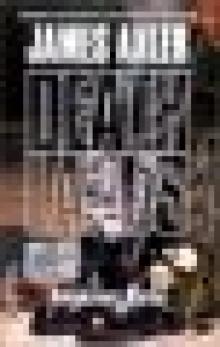 Amazon Gate
Amazon Gate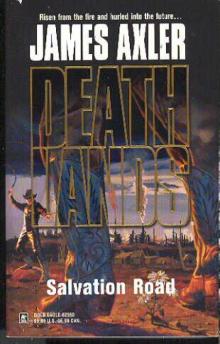 Salvation Road
Salvation Road Pony Soldiers
Pony Soldiers Blood Harvest
Blood Harvest Atlantis Reprise
Atlantis Reprise Necropolis
Necropolis Haven's Blight
Haven's Blight Dragon City
Dragon City Crater Lake
Crater Lake Storm Breakers
Storm Breakers Moon Fate
Moon Fate Eden’s Twilight
Eden’s Twilight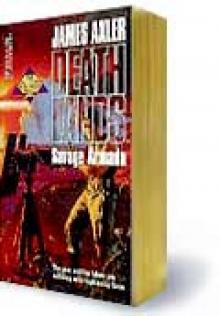 Savage Armada
Savage Armada Desolation Crossing
Desolation Crossing Time Nomads
Time Nomads Cosmic Rift
Cosmic Rift Sins of Honor
Sins of Honor Distortion Offensive
Distortion Offensive Arcadian's Asylum
Arcadian's Asylum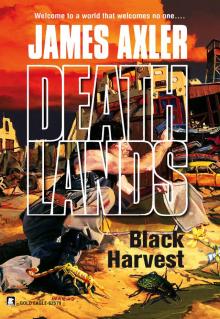 Black Harvest
Black Harvest Iron Rage
Iron Rage Nightmare Passage
Nightmare Passage Labyrinth
Labyrinth Child of Slaughter
Child of Slaughter Cannibal Moon
Cannibal Moon Tainted Cascade
Tainted Cascade Ritual Chill
Ritual Chill Sunchild
Sunchild Wretched Earth
Wretched Earth Northstar Rising d-10
Northstar Rising d-10 Damnation Road Show
Damnation Road Show Hanging Judge
Hanging Judge Dectra Chain d-7
Dectra Chain d-7 Iceblood
Iceblood Deathlands 074: Strontium Swamp
Deathlands 074: Strontium Swamp Angel of Doom
Angel of Doom Sunspot
Sunspot Ice and Fire d-8
Ice and Fire d-8 Pilgrimage to Hell d-1
Pilgrimage to Hell d-1 Wings of Death
Wings of Death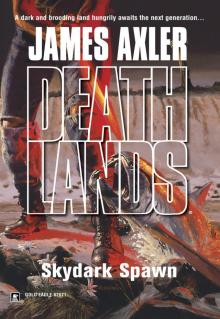 Skydark Spawn
Skydark Spawn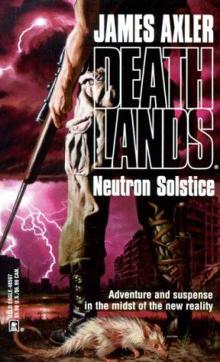 Neutron Solstice d-3
Neutron Solstice d-3 Deathlands 067: Death Hunt
Deathlands 067: Death Hunt Pilgrimage to Hell
Pilgrimage to Hell Siren Song
Siren Song Perdition Valley
Perdition Valley Dark Fathoms
Dark Fathoms Remember Tomorrow
Remember Tomorrow Crucible of Time
Crucible of Time Savage Armada - Deathlands 53
Savage Armada - Deathlands 53 Judas Strike - Deathlands 54
Judas Strike - Deathlands 54 End Day
End Day Dark Resurrection
Dark Resurrection Deathlands - The Twilight Children
Deathlands - The Twilight Children Deathlands 068: Shaking Earth
Deathlands 068: Shaking Earth Breakthrough
Breakthrough Death Hunt
Death Hunt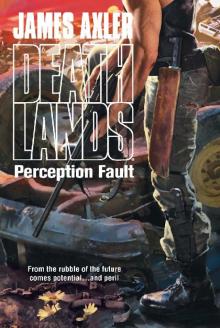 Perception Fault
Perception Fault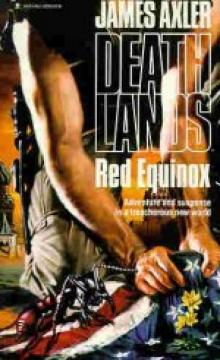 Red Equinox
Red Equinox Motherlode
Motherlode Deathlands 071: Ritual Chill
Deathlands 071: Ritual Chill Hell Road Warriors
Hell Road Warriors Downrigger Drift
Downrigger Drift Gaia's Demise
Gaia's Demise Hell's Maw
Hell's Maw Devil's Vortex
Devil's Vortex Prodigal's Return
Prodigal's Return Deathlands 122: Forbidden Trespass
Deathlands 122: Forbidden Trespass Scarlet Dream
Scarlet Dream Bloodfire
Bloodfire Plague Lords (Empire of Xibalba, #1)
Plague Lords (Empire of Xibalba, #1) Moonfeast
Moonfeast Latitude Zero
Latitude Zero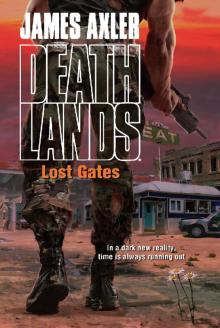 Lost Gates
Lost Gates Dark Carnival
Dark Carnival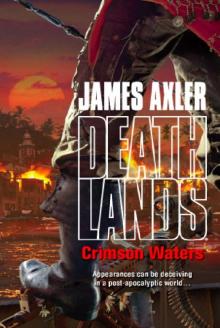 Crimson Waters
Crimson Waters Vengeance Trail
Vengeance Trail Apocalypse Unborn
Apocalypse Unborn Doom Helix
Doom Helix Sorrow Space
Sorrow Space Separation
Separation Northstar Rising
Northstar Rising Red Holocaust
Red Holocaust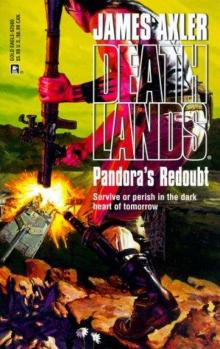 Pandora's Redoubt
Pandora's Redoubt Chill Factor
Chill Factor Prophecy
Prophecy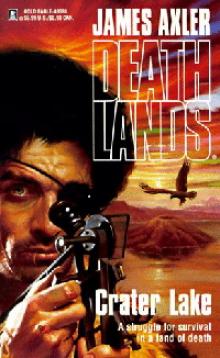 Crater Lake d-4
Crater Lake d-4 Apocalypse Unseen
Apocalypse Unseen Watersleep
Watersleep Judas Strike
Judas Strike Time Castaways
Time Castaways Baptism of Rage
Baptism of Rage Polestar Omega
Polestar Omega Red Holocaust d-2
Red Holocaust d-2 Outlanders 15 - Doom Dynasty
Outlanders 15 - Doom Dynasty Way of the Wolf
Way of the Wolf Deathlands 075: Shatter Zone
Deathlands 075: Shatter Zone Shadow Fortress
Shadow Fortress Outlander 05 - Parallax Red
Outlander 05 - Parallax Red Shaking Earth
Shaking Earth Playfair's Axiom
Playfair's Axiom Truth Engine
Truth Engine Homeward Bound
Homeward Bound Desert Kings
Desert Kings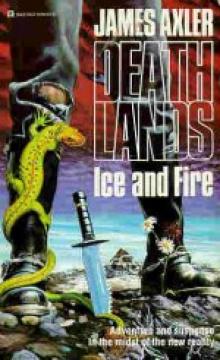 Ice and Fire
Ice and Fire Zero City
Zero City Palaces of Light
Palaces of Light No Man's Land
No Man's Land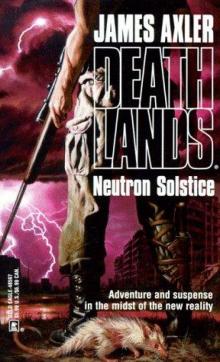 Neutron Solstice
Neutron Solstice Devil Riders
Devil Riders Thunder Road
Thunder Road Deathlands 118: Blood Red Tide
Deathlands 118: Blood Red Tide Deathlands 114: Siren Song
Deathlands 114: Siren Song Reality Echo
Reality Echo Hive Invasion
Hive Invasion God War
God War Chrono Spasm
Chrono Spasm Judgment Plague
Judgment Plague Blood Red Tide
Blood Red Tide Dectra Chain
Dectra Chain Strontium Swamp
Strontium Swamp Seedling
Seedling Shatter Zone
Shatter Zone Hellbenders
Hellbenders